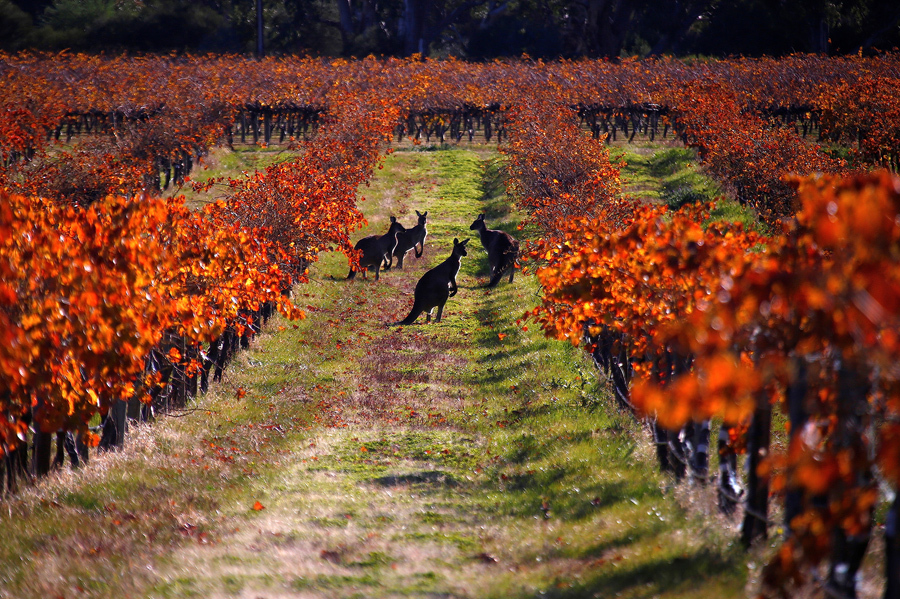The Daily Escape:

Kangaroos in a vineyard in Barossa Valley Australia, June 2017 – photo by David Gray
People can’t stop talking about the Donny/Vlad meeting in Hamburg, and the idea that Trump’s position regarding the potential Russian involvement in the 2016 election is: “Let’s move on”. Then, we learned that our new Syria strategy is driven by Russia and its plan for a cease fire.
But, Russia is the story of the Trump presidency. We learned over the weekend that Paul Manafort, Jared Kushner, and Donald Trump Jr. met with Russian lawyers back in June of 2016. But, despite the continued news about meetings with the Russians, appearances don’t make the Trumps guilty. Mueller and his team will examine and understand the full extent of what the Russians did, and what they attempted to do. Only then will we determine if the Russians efforts had any effect.
There are two broad areas of potential Russian involvement to consider:
Interference in the electoral process: Russians attempt to manipulate domestic politics of many countries, including the US. We do the same. How serious is the threat? Political candidates already use a full array of tools and technologies to persuade voters toward specific social and political agendas. This persuasion effort is as old as humanity itself.
Whether tech-centric forms of propaganda, employing social media, fake news and data-mining techniques are effective remains to be proven. America has been engaged in exactly this sort of exercise in foreign lands for a long time, without significant (or lasting) success.
These technologies can only support ideas and feelings that are already out there. So, what was out there? Consider these:
- Hillary’s emails threatening national security!
- Dispensing contradictory, or conflicting, information like “Hillary Clinton is very sick”.
- Using social connections to generate, or modify, beliefs, like “Trump is a successful executive who can fix the government”.
This type of information warfare is a lot like managing a stock portfolio. Hackers write small, diverse news stories and then wait to see what pays off. It is unclear that hackers were the tipping point in the election, and it is far from clear that the Russians were the sole party behind them. We don’t talk about the many countries that tried to influence our elections, including Saudi Arabia, China, Israel, and Ukraine. Is it more acceptable that the Saudi’s did it the “right” way, by donating massive amounts to their candidate’s campaign?
It is highly unlikely that there was collusion between the Trump campaign and the Russians regarding interference in the 2016 election.
Hacking into political databases: the “Russian hacking” stories are not just that Russians hacked the computers of US political operations including the DNC, but that the Russians have somehow delivered the election to Trump. Thus, the story morphed from “Russians infiltrated DNC computers,” to “Russians hacked our democracy.”
The first is both possible and probable, but the second is just wrong.
Hacking our democracy requires changing or destroying votes for one side in the presidential election, or suppressing voter turnout. Not even the Russians have the resources to pull off that feat. They may have preferred that Trump win, they may have done a few things, and Trump won, but that isn’t “hacked our democracy”.
Wrongo thinks it is probable that “Russian hacking” occurred. It is a serious story, but it needs to be placed in context. Yes, Russia has a political agenda. Yes, they use dirty tricks to influence political outcomes. Yes, this needs to be taken seriously. The problem is that once that is taken out of context, everything is reduced to political talking points. We are asked to choose between two absurd choices: Either Trump is a Russian stooge, or accusations against Trump are a baseless pack of lies.
The likely “truth” is that Russians were doing something, but what they did wasn’t material to the (relatively) close outcome of this election. This has been crowded out of serious discussion.
And who hacked us is still not definitively attributed: there are too many suspects with a motive, means, and opportunity. We can’t yet discount the possibility of domestic operatives (or disgruntled campaign workers) or political plants within campaigns doing mischief.
Sooner or later, we will figure out the definitive attribution for the hacks. And 2018 will bring new tools and techniques.
Who falls short may depend more on message, and less on technology.
Time for a tune. Here is Jason Isbell and the 400 Unit doing “Hope the High Road” (leads you home again):
Takeaway Lyric:
I know you’re tired
And you ain’t sleeping well
Uninspired
And likely mad as hell
But wherever you are
I hope the high road leads you home again
To a world you want to live in
Those who read the Wrongologist in email can view the video here.
